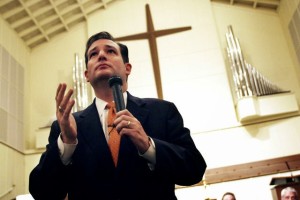Friday, January 23, 2015
Dear Nice Person,
Thank you for writing and thank you for your questions about my pastoral reflections for Senator Ted Cruz.
I’m impressed with your questions. More than that, though, I am pleased to see your willingness to engage in honest conversation with someone who holds different opinions. That kind of curiosity and openness is lacking in our current public dialog and I applaud your effort.
You are a student in a conservative Christian school and I am a progressive Christian pastor. You say you were “intrigued” by my letter and I can only assume that is because you have had very few opportunities to hear an articulation of Christian faith from a perspective that is different from your own. I get that; I was raised fundamentalist and it was years before I was able to see how very, very large this Christian tent actually is. I love that about our faith, but I know a lot of people are threatened by such diversity. I hope our conversation will help you see diversity is not harmful but instead is immensely helpful and healthy.
I would like to begin where you ended: “was your letter more about your love to serve the will of Christ or more about serving the love of ideology?” you asked. A piercing question and I accept the challenge to critique myself. Any of us who presume to speak up and try to influence a larger conversation must constantly evaluate the beliefs that shape us. For me, I can honestly say: “No” this is not an ideology but “Yes” there is a paradigm, a framework, a fundamental perspective I hold: for people of faith, love of God and love of neighbor must be the motivation behind everything we do.
 For this particular pastoral letter to Senator Cruz, I sought to articulate that foundational vision of faith and faithfulness in order to raise the question: do his particular political approaches that I mentioned in the letter demonstrate love of neighbor? Obviously I do not think so, but even if my questions lead Senator Cruz to ask his own questions, then something good will have come from my effort.
For this particular pastoral letter to Senator Cruz, I sought to articulate that foundational vision of faith and faithfulness in order to raise the question: do his particular political approaches that I mentioned in the letter demonstrate love of neighbor? Obviously I do not think so, but even if my questions lead Senator Cruz to ask his own questions, then something good will have come from my effort.
A number of years ago, I hosted a conversation at a denominational conference between two of my Christian friends who had both been active in politics: one a Republican and one a Democrat. One of the questions I posed to each of them was: “How has your faith influenced your politics?”
My Democrat friend had thought long and hard about that over the years and talked about how this notion of “love of neighbor” had informed his work as a state legislator. My Republican former mayor friend was taken aback; he had never even considered that there should be an  intersection between his faith and his politics.
intersection between his faith and his politics.
(Of course I am not talking here about unconstitutional influences of institutional churches within our political system; I am extremely grateful for the notion of separation of church and state that is fundamental to our nation’s integrity. Rather I am talking about the spiritual values that can foster unity and harmony, peace and justice within a society. And of course those spiritual, ethical values are not the sole domain of any religion; many non-religious people share these values with us. But in these particular conversations, I’m reflecting on the values that are clearly a part of the Christian tradition you, Senator Cruz and I are a part of.)
I don’t consider myself to be particularly political. I am a big picture person and I don’t know enough to be able to craft political programs, policies and solutions to address our societal problems. But then, on the other hand, I believe we all must be “political” in the sense that we live in this society together. (The Greek word, “polis” = “city” describes a people’s shared life together.) So my big picture, my core criteria as I consider how we should treat one another as individuals and as groups of people continues to be the love of neighbor.
You asked: Does someone who is against the Affordable Care Act have less Christ-like attributes than someone who supports it?
The ACA is not perfect but it’s what we’ve got and, as best as I can tell, seems to be helping. If there are problems, then our politicians should tweak the law and improve it. But again for me, the bottom line and core criteria is the concept of neighbor. In America, some years ago, we made the societal decision to provide accessible and free education for all our children. In our country, even those who are not citizens have the right to education. Maybe because I am a former nurse, in my way of thinking, access to health care is an equally important and fundamental right and should be the practice of a just society. People with “Christ-like attributes” can have different opinions about how we address this issue; but if we say we are Christians then I would say the way of the Christ demands that we follow his way and work on behalf of healing and wholeness for all people.
You asked: Does someone have more of the love of Christ inside their heart who supports illegal immigration than someone who is opposed to it?
Look at the way you framed your question, my friend. Do you really believe those of us who support immigration reform actually “support illegal immigration?”
Jesus, as a faithful Jew, stood squarely in the prophetic tradition of Israel wherein the governmental and religious leaders, all the people as a matter of fact, were charged with hospitality.
This fundamental expectation was grounded in the generosity of the God they served “who executes justice for the orphan and the widow, and who loves the strangers, providing them food and clothing. You shall also love the stranger, for you were strangers in the land of Egypt.” 
Here is my paradigm: politicians who claim to stand with Jesus must be responsible for creating political approaches to immigration that pass the tests of justice, compassion and hospitality.
You commented: I noticed that you mentioned “the rich” quite a few times in your letter. While I am not defending those who are affluent with the blessings our Lord has given them and not using it to proclaim glory to Him, I have to ask: are not the rich paying, by far, more in taxes to the federal government than “the working poor”?
Again, within the Judeo-Christian prophetic tradition, “the rich” carry a greater responsibility for others and suffer a greater judgment whenever “the poor” are neglected and oppressed. And again Jesus, standing in this prophetic tradition, consistently held “the rich” to a very high standard. Wealth in itself is not the problem; rather selfishness and self-centeredness is what damages a human soul and even the soul of a nation.
Also, I would say that material wealth is not a sign of God’s “blessing.” When Jesus spoke of those who are blessed in his famous, enigmatic beatitudes, it was always blessing in the absence of money, power or prestige. (“Blessed are the poor in spirit, the merciful, the peacemakers…”) There is a harmful stream of Christianity that imagines prosperity is a mark of faithfulness; this is not the way of the Christ.
Thank you for your time, you say in your closing; and God bless you and your family. And I say: May God go with you as you keep asking faithful questions. And may we both go with God on this forever journey of faith.
Grace and Peace,
Charlotte
